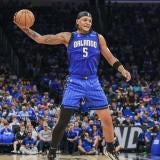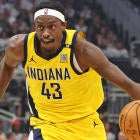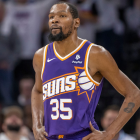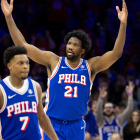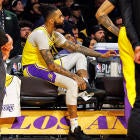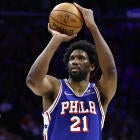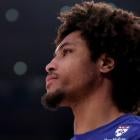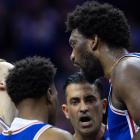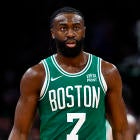The Magic's new front office has not really put its mark on the roster. Aaron Gordon, Elfrid Payton, Nikola Vucevic and Evan Fournier are still around as the core built by dismissed general manager Rob Hennigan -- the same young players with whom Orlando fans spent years trying to stay patient.
President of basketball operations Jeff Weltman and GM John Hammond brought in veterans and a high-ceiling rookie in Jonathan Isaac, but the changes were more internal than anything. However, with new leadership comes a fresh start and lots of room to operate and make mistakes.
But therein lies the issue for the Magic's upcoming season. This is an experienced roster that's been around for a while. At this point there should be an expectation of playoffs, but the front office is new and expecting it to have a playoff team ready to go would be unfair. Even bottoming out could be a positive: That sets the new front office up for a high draft pick and a chance to draft a future piece.
For a new regime, gaining a chance to hit the reset button could be as valuable as an immediate playoff run. However, with a roster already set in place there isn't any reason to rush into anything. Judging what would be an actual successful season in Orlando is impossible at this point. So instead of setting expectations, let's let the Magic build expectations to be set.
It's like the first year of a rebuild, but the Magic already have a lot of young pieces set to build around. No matter what Orlando does, it feels practically impossible to be disappointed with them. That's just from the overall perspective though. There are smaller goals that the Magic should be hoping to reach this season.
The future of Gordon and Payton
For starters, they need to figure out what they have in their young assets. Is Payton their point guard of the future? Do they believe in Gordon? Neither of them look like they'll be receiving contract extensions, which means they're going to be playing for money this year. Sometimes players step up when that's on the line.
Gordon probably isn't playing much small forward this season after last year's supersized lineup disaster. He played his best minutes at the four. Now it's up to the Magic to get the most out of him. So far he's shown more potential than actual results. He's earned comparisons to a poor man's Draymond Green or Blake Griffin, but right now his best NBA skill is his absurd athleticism. Run Gordon on a screen, have him dive toward the rim, and just throw the ball up so he can get it. He's worth a highlight per game.
With a contract extension unlikely to happen, Gordon could be playing for more than just his future role with the Magic this season. Gordon is going to have to establish his own value in restricted free agency and prove that he's worth the money he'll want. This is a big year for Gordon to prove that he's still a young player worth building around at 22 years old.
If the Magic do decide that Gordon isn't the path they want to go down then they do have a potential backup. Jonathan Isaac has a skillset that many have argued overlaps with Gordon's. He's too raw at the moment to say for certain how he'll develop, but the defensive-minded four with potential to play the three does sound very familiar. If Isaac has a phenomenal rookie year, while Gordon just shows more of the same, then the Magic might decide that it's time to build around new youth.
The same goes for Payton. April is the month of Payton, and last year he was arguably the Magic's most important player. When Payton played well, Orlando sailed; when he struggled, so did the rest of the team. There's a little bit of "well, duh, of course when players play well, teams win," but for Payton the difference in his game for wins compared to losses is noticeably higher. In wins last season Payton averaged 14.7 points, 7.8 assists and 4.9 rebounds while shooting 50 percent from the field. He's a more efficient scorer with a true shooting percentage and effective field goal percentage above 50 percent and most noticeably, a net rating of 16.6. The Magic were better when he played better.
However, in losses not only were the Magic worse but so was Payton. His shooting metrics fall to the 40's in field goal, true shooting and effective field goal percentage. His net rating plummets to minus-13.9 and his per game numbers all take a slight dip. Payton obviously can't be at the peak of his game on a nightly basis, but it's obvious that the Magic's results are heavily reliant on him playing well.
Who's still here?
There's other parts of the Magic that will be intriguing to pay attention to this season with Nikola Vucevic almost always on the trade block by February and seeing if Evan Fournier can get any better than he is right now. There is talent on this team, but as always the fit is weird and there's such a heavy reliance on youth that it's hard to know what's going to come out of it. There's a real question about what the Magic plan to do with the players that are left behind and what roles they'll play this season.
- Bismack Biyombo signed a huge contract in the summer of 2016, but last year the log jam at center limited what he was able to do with the team. Is there a different more effective way Orlando can use him?
- Fournier actually got a lot better last season, but it was hidden behind a primary creator role change that just wasn't best for him. He played his best basketball when Orlando started using him as a secondary creator again and that's how they should use him this year.
- Vucevic has been the most consistent player on the Magic for years and probably their best player. His team-friendly contract has also made him their most tradeable asset. Will this new front office finally bite the bullet on dealing him or is he too good to move at this point?
- Terrence Ross had a really awkward transition last year going from a playoff team to one in the middle of trying to find itself. He's going to have a full year to work with the same core this year, and he's going to be a starter. Like Vucevic, he's a movable piece but he might be too good for Orlando to actually move.
The new faces
Most of the Magic's questions are leftovers from the previous front office. The new group came in and immediately signed veterans. What role are the vets going to play on this team? There's a lot of them and these aren't the typical roster fillers. These are rotation-level players who will take minutes from young players who aren't stepping up. Jonathon Simmons and Marreese Speights were brought in because they've been part of successful teams and know how to win games. Most of the youth on this roster is experienced enough to where mentorship is no longer necessary. They will challenge the youth to be better, or take their spot in the rotation.
Bottom line
The Magic may have no expectations as far as 2017-18 success (or lack thereof), but within, they have lots of individual expectations that could very well decide the future of this team. If their young assets finally break through, then this is a roster that could be salvaged, re-tooled and turned into a playoff team. If no progress is shown from last season, another rebuild could be on the way.
As for now, they're an unknown product: a team on the verge of a playoff run and on the verge of another high lottery spot.








